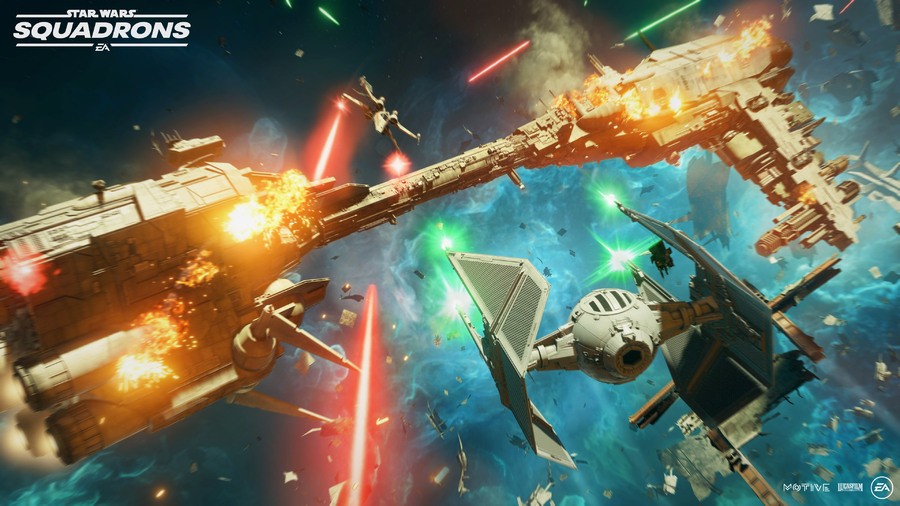
A pretty exciting interview to bring everyone today, as we have an interview with composer Gordy Haab, about his work scoring Star Wars: Squadrons, the arcade flight sim title from Motive Studios. We do a deep dive into Gordy's history with Star Wars games, how the entire soundtrack for Squadrons is built around a single piece of music, just how different the landscape is for Star Wars music compared to what it once was, and how a fan film project led to one of Star Wars' most prolific composers. Let's dive in!
Push Square: How was the scoring experience for Squadrons different than any of your previous Star Wars (and non- Star Wars) game experiences?
Gordy Haab: Each of the Star Wars projects I’ve worked on has had unique challenges or unique aesthetics that they needed to live within. Usually based on the era or the type of game. For Squadrons, because it was at its core a flight sim, that’s the idea behind it, you’re hopping into these TIE Fighters or X-Wings, and it’s a really exciting experience, over the top. The score for it also needed to serve that. The approach was different than a Jedi: Fallen Order, which had more narrative focus and definitely a darker tone. This one needed to be more fun, over the top. There's lots of action, so we need high impact type music. That was the approach and I’d say that differed certainly from the most recent Star Wars scores I’ve worked on. Even Battlefront 2 was more narrative-heavy. Battlefront 1 is probably the closest in terms of the amount of action music needed. And since this takes place after Return [of the Jedi], Squadrons kind of had to fit into that sort of nostalgic feel as well.
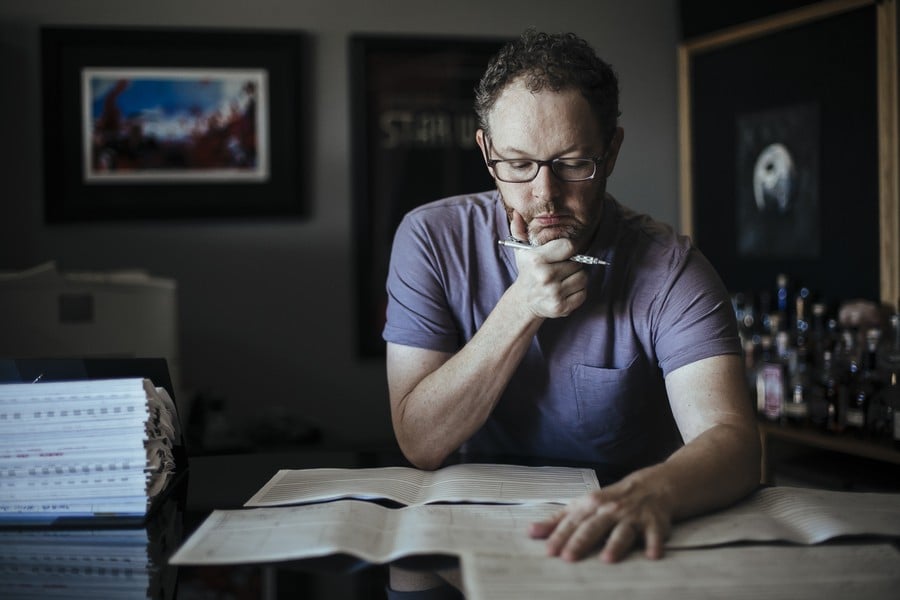
It needed to sound familiar, but not quite exactly what we’ve heard previously.
Exactly.
How did VR factor into the score in any way? Or did it?
It did a bit. It factored into how the score was produced, not necessarily how it was written. I wrote a score like normal, how I’d write for a regular game. We chose to record it in a way that it could be mixed and mastered into surround so that it could also be immersive. The idea being that you’re literally standing at the conductor’s podium, and have the music taking shape around you. That was the concept behind it anyway. In a VR setting, it’s so visually immersive, and auditory too because of the sound effects. Having that music wrap around you adds to that grandeur. We definitely factored that into the production.
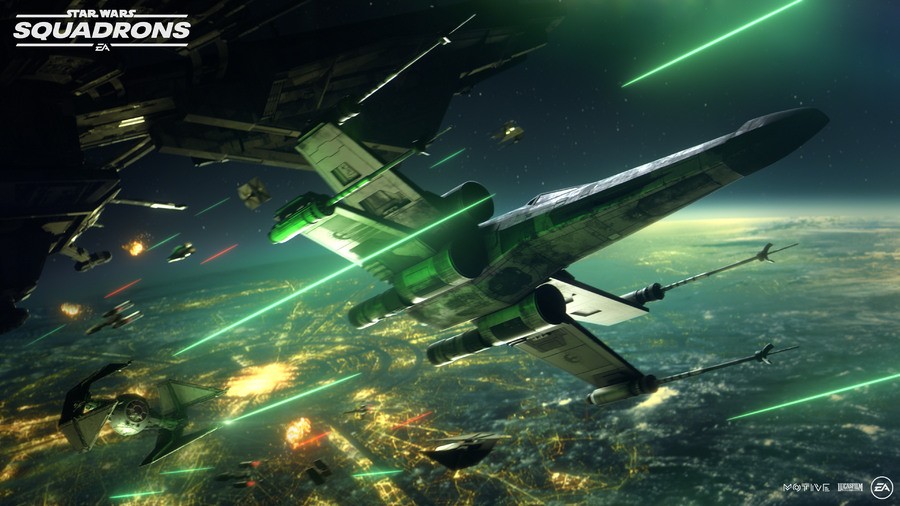
This is a bit of a different flavor for Star Wars when it comes to games. It’s been a number of years since Star Wars has had a title built entirely around flying. I think the last one might have been Rogue Squadron 3? In what ways do you think the sound of Star Wars has changed and evolved since we last saw a title of Squadrons’ ilk?
The sound has changed and evolved in a couple of ways. The most noticeable is that there are just more composers that are part of the Star Wars music canon. Like me, for example, I’ve brought my own aesthetic to the Star Wars game universe. And now we have Michael Giacchino and John Powell. They've brought their aesthetic to the film universe. Ludvig [Göransson] bringing his sound to The Mandalorian too. More composers with unique visions have been folded into this canon. And by the very nature of that, the sound is evolving. But now, even just trying to do something more symphonic and traditional has changed quite a bit, from the standpoint of how we record it, how we produce it. Try to modernize the sound a bit. Even from a production standpoint, that immersiveness we mentioned. But if you listen to some of the original scores, not just Star Wars, but many films from the late ’70s or early ’80s, the approach to the sound is a little different. Now the sound quality is through the roof.
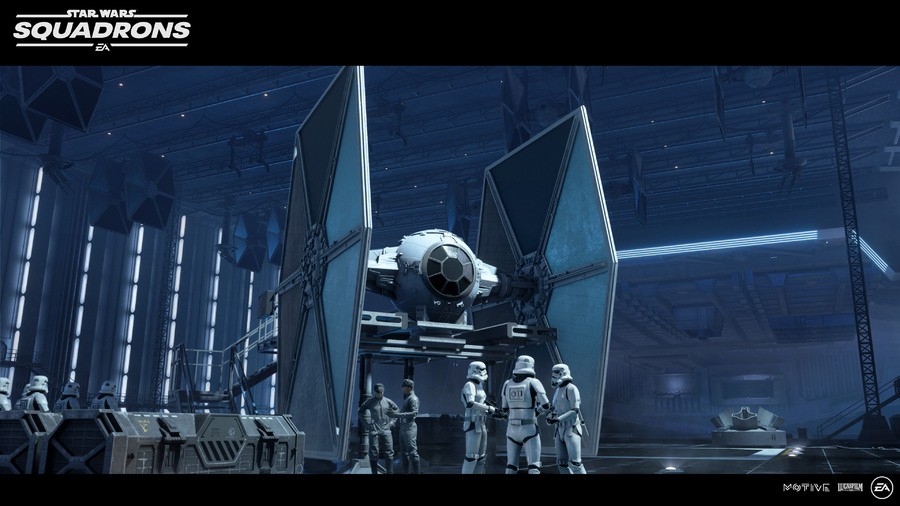
Oh, I made the whole score on my computer last night!
Yeah, it’s pretty insane! That has changed the aesthetic of this music by far. Even for my own personal aesthetic. Since I started working on Star Wars, back in the beginning I felt like I had to be very true to the original aesthetic and live within that, but slowly start introducing more of my own sound.
Trying to shift away from the status quo as it were.
Exactly, and I’ve certainly come into my own in that sense. I’ve gotten to the point now where I don’t even really think of anything as being source material anymore. I just do my own thing, and it seems to fit nicely into the Star Wars game universe.
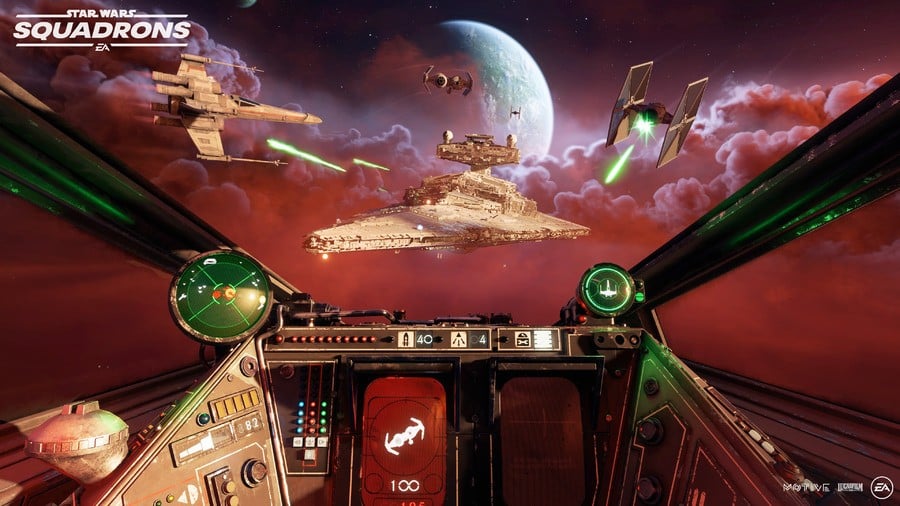
I’d consider that ideal at this point even! There've been plenty of issues with Star Wars media being a little too reverential to those original scores in the past. Do something new!
Yeah, give us something new! I’ve even had those conversations and was relatively firm about my stance on that from the very beginning. Even with Battlefront 1. The assignment, the directive was to write the “b-side” to the original Star Wars score, but even then I took that to heart. Let’s avoid using themes from the original films, let’s try to write an original score. We could just use those original themes from the soundtracks themselves. You play Battlefront; you hear music from the original films. Anything new though, it just didn’t make sense to rehash what we already had. What do I bring to the table? What do I add? How do I make this new, add value to it? When writing new themes, developing my own sort of musical aesthetic within that universe, these are things I’ve kind of worked on now for the better part of a decade at this point. It’s just sort of second nature.
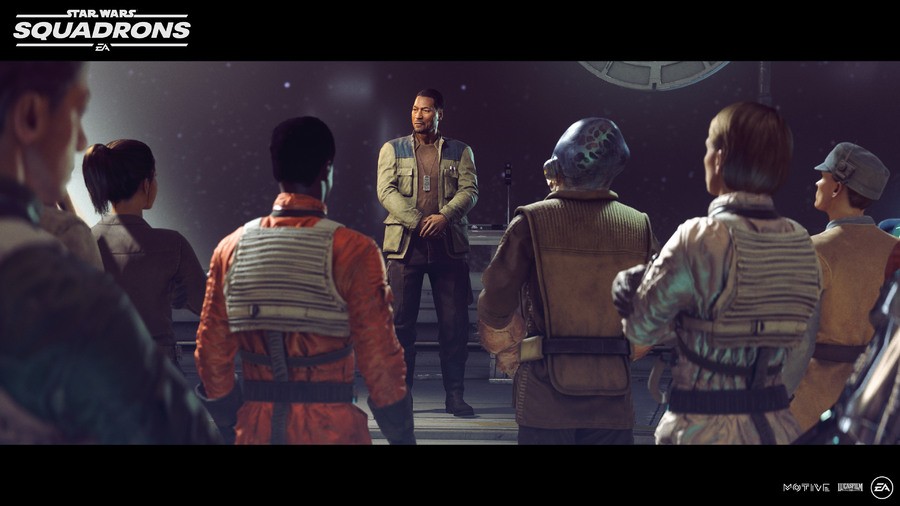
Now I’m kind of curious though, has there been any sort of buildup of leitmotifs of your own from game to game? Is that starting to showing up?
You know actually yeah. Sometimes. Particularly because of EA, these games are all EA’s content. I have on occasion used little easter eggs from previous games. Bits from Battlefront in Fallen Order, and Fallen Order in Squadrons, but crossing over direct pieces of music or themes, that doesn’t happen often. But I like throwing little hints of them in. There’s a wookie moment in Fallen Order where I call back a wookie moment in Battlefront for example. And of course, from Battlefront 1 to 2, a lot of those themes carry over. It makes more sense to use and reuse themes there though.
Given that the game swings back and forth between both the Empire and Rebellion, how did that factor into the score? I’d imagine you’d want the sounds for each faction to be different from one another?
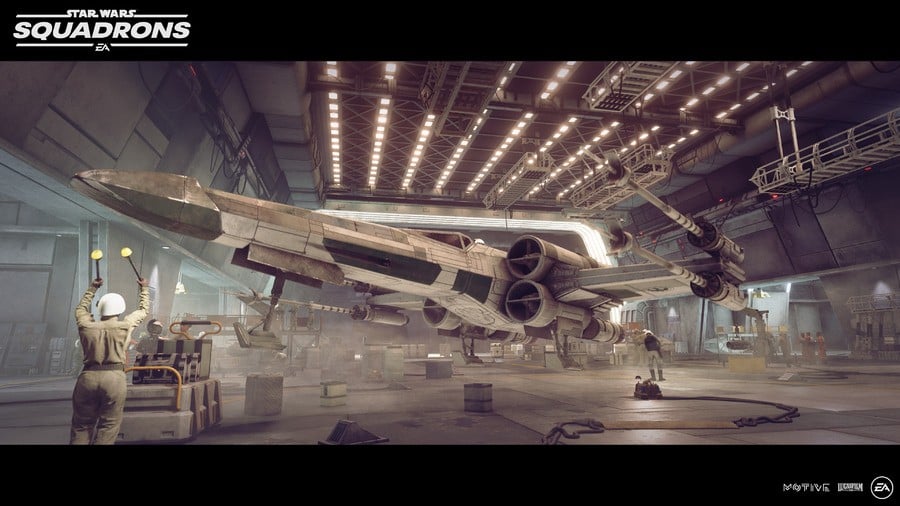
Absolutely. So what we decided to do was, we wanted to have one theme for the whole game. There’s a Squadrons main theme and then from that theme, I branched off and wrote a variation of it for the Rebel theme, and then one for the Empire. But they all relate to that first main theme. I just orchestrated it differently, changed a few notes here and there, re-harmonized it. Make them feel more Imperial or more Rebel.
Make one more ominous, or more whimsical. Hopeful’s probably a better way to phrase it.
Yeah, triumphant! But they’re still really the same theme. They just get played in different ways. By doing that, we had complete mobility with the theme throughout the entire score. Now you can be playing as a Rebel and hear the Imperial version and it still doesn’t feel out of place. It’s just a darker version of the theme you’re used to hearing. So that was the idea. Let’s have this anchor point theme, then branch out leitmotifs from that to create both Rebel and Imperial music.
Did that apply to the remainder of the other pieces in the game too? Was the entire score built out of the theme?
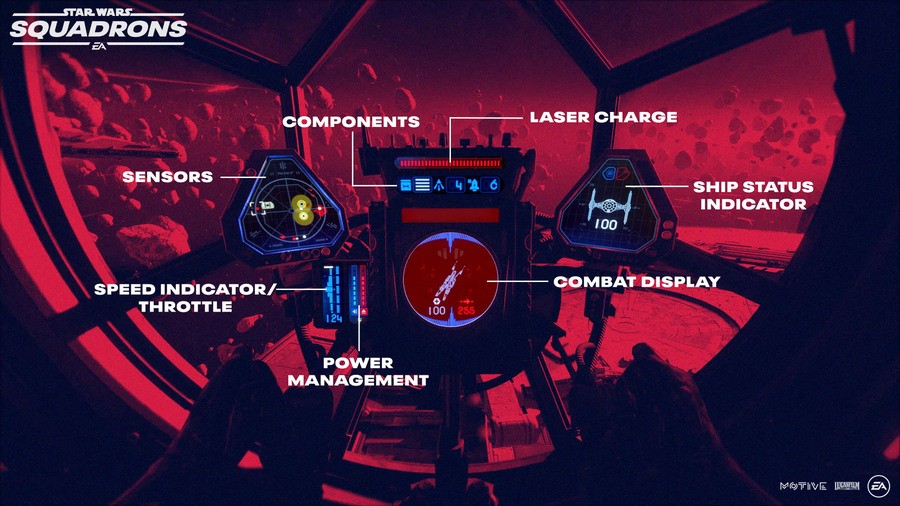
Everything was built out of that main theme! Quite literally the entire score is based on that. And it’s 3 hours of music, so we got a lot out of it. Lots of re-orchestration and repurposing. We use it as sort of a through-line for the whole score that ties everything together. That was the concept. As you’re playing, there’s an Imperial or Rebel version that can play at any moment. Any scenario will have two or three pieces of music to call from based on how you’re playing. If you’re playing as Rebel and someone else is an Imperial, you’re going to be hearing completely different pieces of music. And then once you hit a certain trigger point in the game, when the intensity needs to ramp up, it’ll call up a little transition to take you to a new piece and when a round ends, there are basically four options. You either played Rebel and won, Rebel and lost, or Imperial won, Imperial lost, and there’s a thing in there for each of those possibilities. No matter what happens, it’s always faction-specific but it's still factored into that main theme.
Star Wars projects tend to involve space combat and flight, but rarely to the extent that Squadrons emphasizes it. Was the “infinity of space” freeing creatively, or was it constraining to some degree?
In a way, it’s one note in that it’s so vast. But because you have something so vast, you have so many possibilities within it. But what we didn’t want to do, since space is so, I don’t want to say random, it’s not location-specific. It’s not like Battlefront, where you go somewhere like Tatooine or Hoth. When you’re on Hoth, the music sounds like Hoth,. But here, the music needed to sound more generally, globally like Star Wars. I go back to the theme, that’s that one through-line that always carries. It’s either faction specific, or of course in the single-player, which had narrative cues to work with, but for the bulk of the game, the multiplayer mode, there are multiple options for music to call up. Rather than write environment-specific music, I just wrote a big batch of music. So each time you play, it might be different, even if you replay the same scenario.
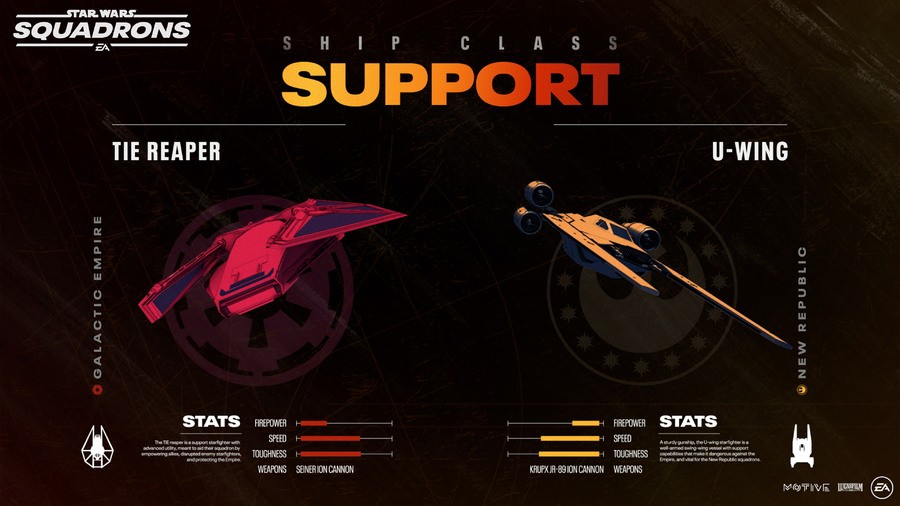
How did you want to both be subservient to, but distance yourself from the sound most people would associate with “Star Wars?” Namely, how did you strive for Squadrons to sound like both a part of this universe, as well as its own thing? You seem to use reprises more carefully and sparsely, which I appreciated! (Which is how I felt about the Jedi: Fallen Order score too!)
So this is my, I think, I don’t know even know which number of Star Wars game this is for me, 9th or 10th? My approach felt a little easier since I’m used to it. It’s an aesthetic I’m very used to working within. That helps a lot.
Also, I definitely need to talk about era. That’s a common thread for these Star Wars games too. They’re all based in an era. For it to feel like that era, it needs to feel like a continuation of what happened right before it musically. Even including the films. This is right after Return of the Jedi, so my launching pad sonically is what did Return of the Jedi sound like? And now how do I stretch that and take it further? That’s my thinking on something like this. Find the era a project lives within. I don’t want to rehash what came before. I want to start where that project left off, and write something new furthering that aesthetic.
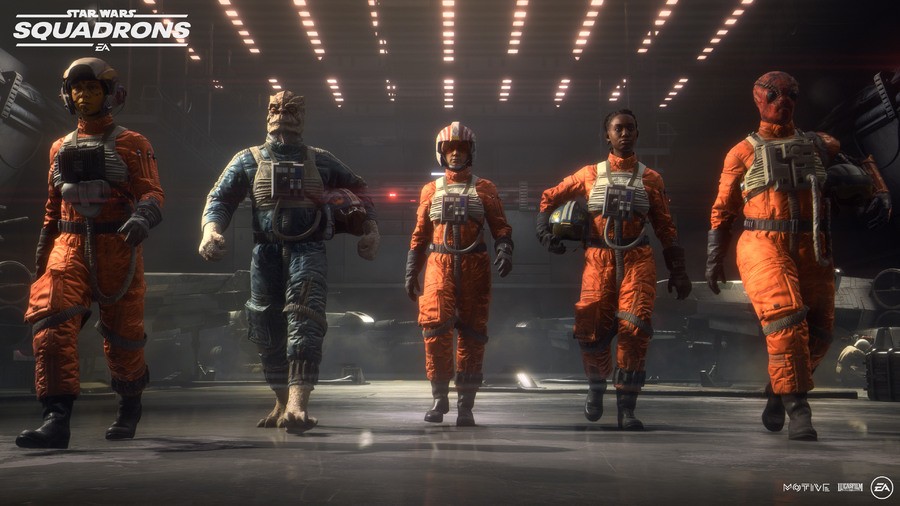
When I was working on The Old Republic, that was a very unique challenge. That’s set 2000 years before any of the films that we know. I was writing essentially, if we view the music we know from Star Wars as “modern music,” then I was writing the equivalent of baroque music haha. The baroque themes that led to what we consider “modern music.” I had to pre-date what the sound would be like. What would it sound like? Each one of the scores has had sort of an era-specific challenge.
Finally, I always like to close out first-time interviews by asking what brought you to the industry? How’d you find yourself scoring for games?
I went to USC here in Los Angeles for grad school. Primarily my focus was that I wanted to get into writing music for films. Video games weren’t even something that ever really crossed my mind. But a friend of mine, in my class, Jesse Harlin, [a composer we’ve spoken to previously!] his goal was just to do games. We both went our separate ways and started our careers after school. A year or two had gone by and we were talking and I was like you know I might be interested in working in games, talk to me about it, tell me what you know. And this is right around the same time that I’d been asked to write the music for this Star Wars fan film, called Ryan vs Dorkman. It’s two dudes dressed in their street clothes fighting with lightsabers. The choreography’s absolutely amazing, they’re both ridiculously good. So I wrote the score for that. That was just a fun passion project because I love Star Wars. I may never have an opportunity to work on anything Star Wars, I’m gonna jump on this. It was right around the same time that Lucasarts was looking for a composer to score an Indiana Jones [and The Staff of Kings] game, and I’m still friends with Jesse. And Jesse had moved on and become one of the audio directors at Lucasarts. He called me and said we do have this one thing, do you have anything that you could use to demo for it, and I had just finished this Ryan vs Dorkman thing. So I sent that to him, and he sent it around to various people, and the response we got back was “oh no we’ve already seen this, we’ve heard this. We were actually going to come to you and see if you knew the guy that did the music for this." So it was just one of those perfect moments, a perfect storm Then they hired me for the Indiana Jones game, which led to The Old Republic, and things kept snowballing from there.
And there you have it. We'd like to thank Gordy one more time for taking the time out to do the interview with us. Some previous Star Wars titles under EA took a rather long time to see soundtrack releases, but not so with Squadrons. You can pick up the soundtrack on any of the digital storefronts you'd normally go to if you want to check things out for yourself.





Comments 7
I bought it for PSVR. Installed... played 15min deinstalled. The PS4Pro was just to weak for this in VR.
Release Day Owner.. I like my PS5 but the options to increase the consoles memory sucks. I'm afried to buy new games because of this. Besides that, great system but need to hurry with updates.
Any way to ask EA Motive if they intend to fix the eye tracking lag & ghosting on PS5 PSVR?
So distracting and even outlets like Eurogamer brought it up in their PSVR stream.
To the article itself, great insight into compositions within games. Interesting how he mentions the new composers for the films/TV series. Must feel hard to follow on from John Williams, but equally an honour to expand on his original scores.
Love this, great interview! Although it's extremely cheeky of push square to ask him for an interview when there was literally not even one sentence mentioning either his music or even the game's sound design in the site's review (of a Star Wars game. Really?). Love to see more content like this, though!
@Perryg92 Yeah it was a point I'd never really thought about either! Like sure, there are other composers involved with Star Wars, but I just never took the time to consider that all the new voices helped dictate the shift in sound for the property!
@NeptunisRex Yeah I wish the leap forward on some of the cross-gen stuff were a little more uniform. Especially VR. A lot of the titles seemed to play it safe. I wish we saw what Blood & Truth did a little more!
@RogerRoger Completely agreed! For a property where even tipping slightly over the edge (well, as we both know by now lol) can be hated by everyone, being able to keep it "Star Wars" without re-using anything is nuts!
@BowTiesAreCool More just down to writer preference in that instance This interview and the review itself were done by different folks, with emphases on different areas. Just all about perspective
@Jimmer-jammer Of course! I love doing this interview series!
Show Comments
Leave A Comment
Hold on there, you need to login to post a comment...